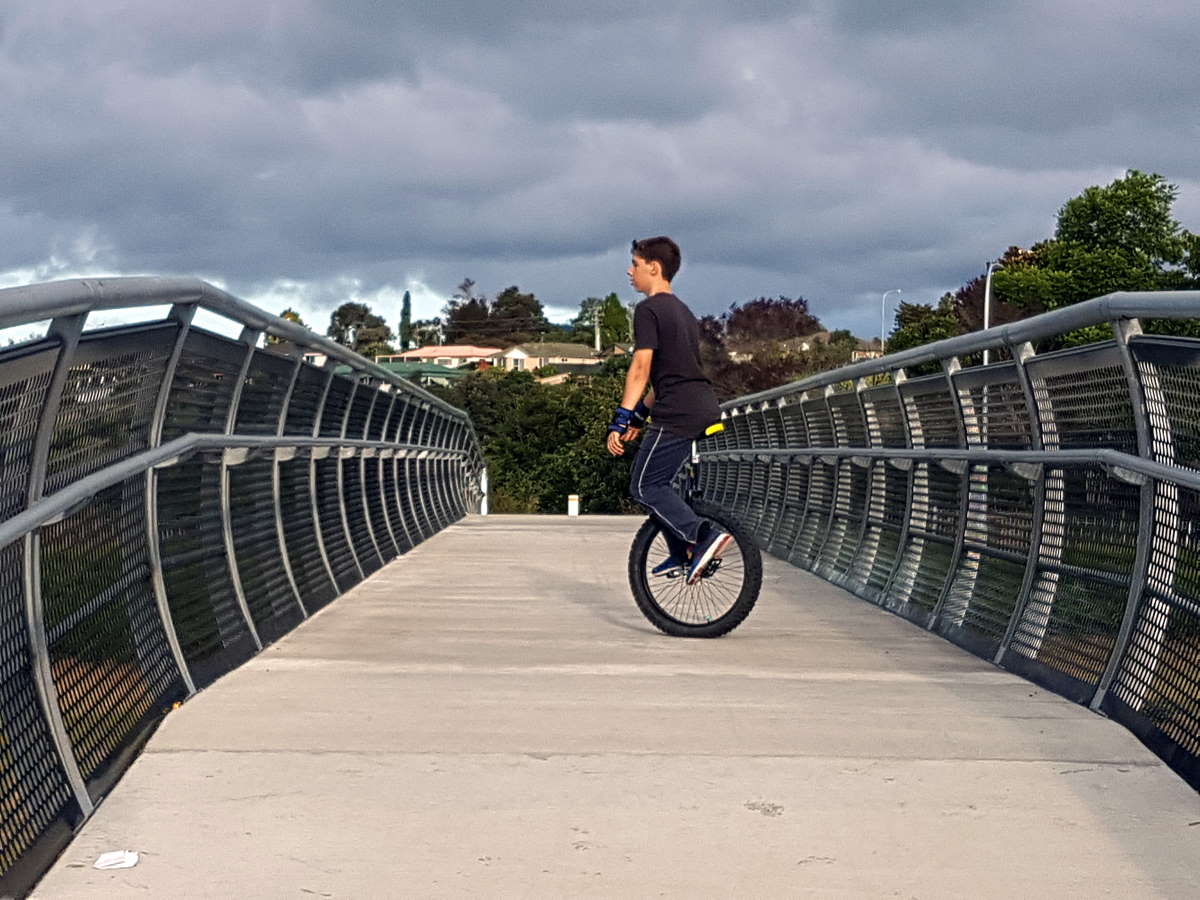If two wheels are too difficult to transport and store for your work commute, join the growing number of single wheel Unicycle commuters.
Can I Unicycle to work?
Short answer, yes! Unicycles can go anywhere that two wheels can go. While unicycles appear mechanically simple – they are! A little careful thought is needed to choose the correct unicycle for your commuting needs.
What are the benefits of unicycling to work?
Unicycles are mechanically incredibly simple. This improves reliability and maintenance compared with other modes of transport.
Unicycles are also incredibly portable and exempt from bike restrictions you may encounter on trains or buses. A unicycle can be carried in one hand and is relatively lightweight. A typical unicycle will weight around 7KG (15-16lbs) or less.
For a student or office worker, a unicycle can be easily carried around campus or to the office. Students can benefit from cross-campus transportation literally at their fingertips.
Low cost. Once purchased, unicycles need little maintenance. Tires are usually the only item to replace periodically. Used unicycles can often be found on eBay and Craigslist to reduce upfront costs.
Are unicycles an efficient mode of transport?
Unicycles are comparable to walking, though faster. Compared to two-wheeled cycling, unicycles are significantly less efficient.
While two-wheeled bikes have a number of gears to allow the rider to use an optimum gear ratio for the speed and effort needed, unicycles are a fixed gear setup. There are a few exceptions to this, with a few highly customised unicycles with two gear ratios, or even rarer an internally geared hub.
Does a unicycle freewheel
Most unicycles on the market are fixed hubs without any free-wheeling capability. Riding a unicycle requires the rider to control speed (acceleration and deceleration) by controlling the pedals. The pedals and hub are a direct mount, move the pedal either backwards or forwards and the wheel turns.
If you purchase a unicycle with a freewheeling hub or look to fit one, ensure you install a disk or rim brake in order to control your speed.
A unicyclist has to work without rest whether travelling uphill, downhill or along the flat. A cyclist in comparison can freewheel downhill.

Do unicycles have brakes?
Most unicycle ranges include models with disk brake options. Brakes are only fitted to particular unicycles within a product range, so be sure to confirm brakes are a standard fitting on your chosen unicycle if brakes are important to you. The braking system on a unicycle is similar to the front brake system on a regular bicycle; consisting of a typical bike disk mounted to the hub, and a hydraulic system with a brake lever mounted forward-facing under the seat.
Brakes can help give the unicyclist a little respite when travelling downhill. Without brakes, the unicyclist has to apply braking pressure through the pedals. Brakes are also useful for basic and advanced manoeuvres, whether it be hopping in place or rock-hopping down at the beach or trail.
Depending on the amount of downhill on your commuting route, a unicycle fitted with brakes can be a worthwhile consideration to rest the legs a little. With skill, a braked wheel is easy to hold at lights without dismounting.
Can I add gears to my unicycle?
Kris Holm and Schlumpf have marketed a two geared hub for unicycles with compatible frames. The pre-2015 hub is compatible with KH frames from 2006, and the newer 100mm hub is compatible with KH frames from 2012 (all KH frames after 2006). The unicyclist changes gear by heel or toe-tapping a protruding mechanical nub on the outside of the hub.
The KH and Schlumpf hub is compatible with disk braking systems and provides a 1 to 1 and 1 to 1.5 gear ratio. With the correct wheel-size, this provides adequate ratios for commuting.
The option of the 1.5 to 1 ratio provides an (expensive) opportunity to choose a smaller wheel size for increased portability of your unicycle.
What’s the best size unicycle for commuting?
Unicycles usually are described based on their wheel size. A Kris Holm 24 will have (approximately) a 24-inch wheel size.

For last-mile commuting after a bus, train or ferry ride into the City as 24 is an excellent option as it is much easier to transport due to its compact size. My son (pictured) regularly does 10km (6.2 miles) unicycle rides with ease.
If you are travelling further to work, consider a 26 or 29-inch unicycle. The 26 being more comfortable to transport and more nimble in, while the 29 will allow you to pedal at a lower cadence for higher speed.
Beyond 29 inches, unicycles become much more challenging to manoeuvre, which is important in heavy and unpredictable traffic. We’d suggest leaving the 36 inch for touring rather than commuting.
Unicycling safely in the City
Unicycles have a significant advantage of a ‘step off’ bailout technique if you get into trouble. Unlike a bicycle where the instinct is to brake hard, which often flips the rider off the bike. Unicyclists tend to bail out forwards, leaving the unicycle to fall.
Unicycle seats have inbuilt plastic ‘bumpers’ on the front and rear of the seat to avoid seat damage from bailing out.
The main challenge with unicycles is mounting points for lights and (if required) a bicycle bell. A rear-facing red light can be installed to the seat-post, and we recommend a front-facing headlamp to provide forward illumination.
A bicycle bell if required, can be installed under the seat, seat-post or you can even get finger mounted bells!
For longer commutes installing touring handlebars can give you some extra mount-points as well as a more aerodynamic riding position.
Safety equipment for unicycling
Shin-guards are a must for all but the most experienced unicyclists. The impact of the pedal on your shin or calve is pretty excruciating and a regular occurrence when learning.
Cycling helmets are a great idea and may be required in your State or Country. Unicycles are often not classified as bikes so exempt from many of the requirements put on cyclists. For safety and simplicity, it’s easiest to follow the conditions for cyclists.
For new unicyclists, wrist-guards can be a valuable, lightweight and cheap piece of safety gear. If you take a tumble, your hands and wrists will take most of the fall.
What maintenance does a unicycle need?
Unicycles need little, but regular maintenance. Check seat-post mounts and quick-release levers before each ride.
Check pedals for damage, cracks or wobbliness each week. Check the hub is mounted securely and the is no wobble or roughness in the wheel hub at the same time.
The unicycle bearings are essentially a sealed, none serviceable item. Avoid the temptation to spray oil, lubricant into the bearings. Adding extra grease into the bearing is often counter-productive, making them run less smoothly. If a wobble or roughness is tracked down to bearings, simply replace the bearings on both sides.
Unicycle tire maintenance
Unicycle tires tend to wear unevenly as the fixed hub means starts and stops occur at the same point on the tires each time. To avoid this rotate the tires every couple of months by partially deflating the ties and then rotating the tire on the rim.
This will help the tire wear evenly, lasting longer and also smooth out the ride.
Clean the unicycle weekly with warm soapy water and gently wash off the soap. Don’t use water under pressure as it will likely get into bearings or hard to dry places in the unicycle frame. Unicycles are generally >steel framed, so a little TLC is required to avoid rust.
What type of unicycle should I buy?
There is a very simple rule here to avoid disappointment. Only buy Nimbus, QU-AX or Kris Holm branded unicycles. Anything generic branded or unknown is likely to cause disappointment at best.
There are bargains to be had on eBay and Craigslist, again check you are looking at one of the brands above. A used brand name unicycle is generally a much better buy than a generic brand new unicycle.